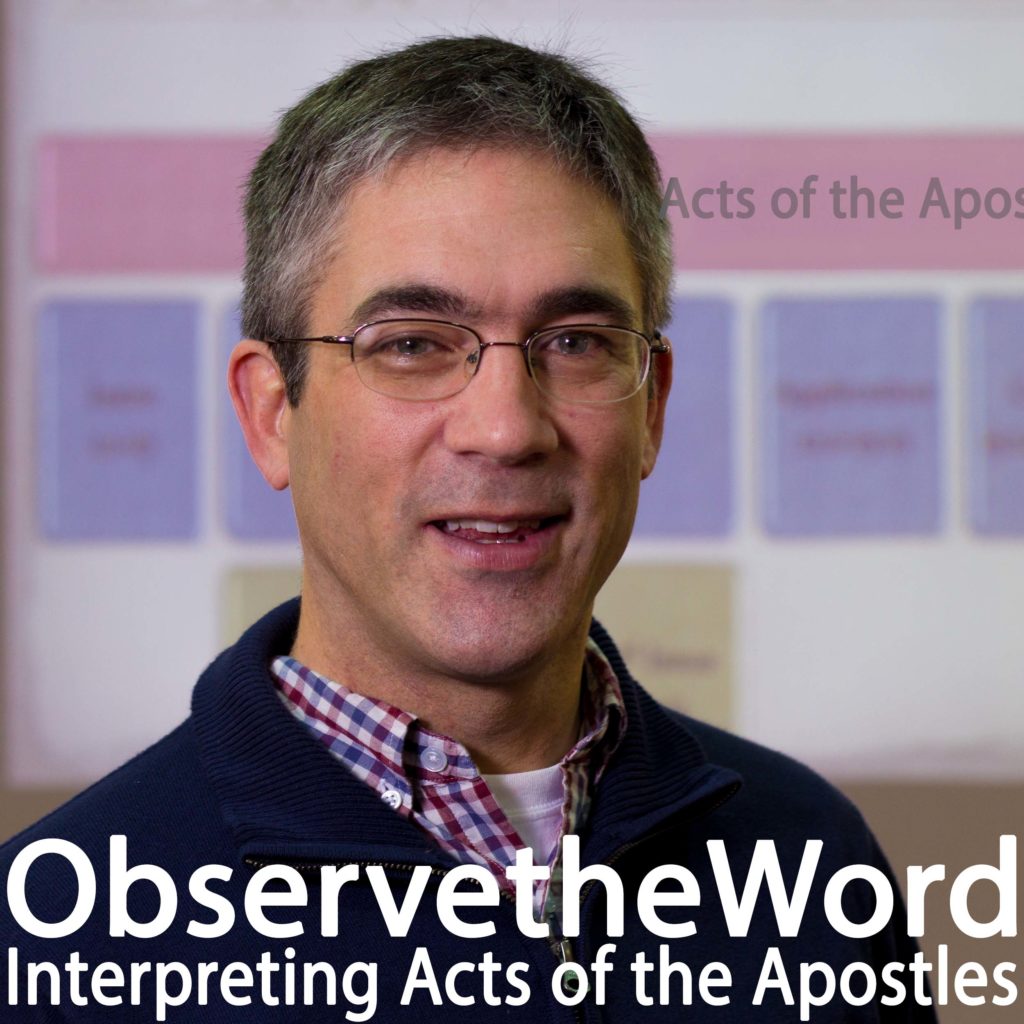Interpreting Acts of the Apostles

The Acts of the Apostles provides an authentic, inspired account of the spread of the early Christian church, giving focus to the themes of Witness to Jesus Christ and power in the Holy Spirit (Acts 1:8). In this series, Bible teacher Michael Brent guides listeners through the structure and thought of Luke’s narrative and considers how Luke uses the narrative as a context for defining and defending the gospel of Jesus Christ, showing that Acts is not only history. Luke wrote narrative theology.
| Part I: The Jerusalem Awakening (Acts 1:1-6:7) |
| 1. The Commission of Jesus Christ |
In Acts 1:1-11, Luke records Jesus commissioning the apostles and ascending into heaven, emphasizing the two major themes of Witness and Power in the Holy Spirit. |
| 2. The Replacement of the Twelfth Apostle |
In Acts 1:12-26, we consider how the small community of believers prepared themselves for the coming of the Holy Spirit. We also identify the overall structure of the book. |
| 3. Pentecost and the Holy Spirit |
In Acts 2:1-21, the Church is born in fire and Spirit at the Jewish Feast of Pentecost, and Peter takes his stand to speak to the multi-cultural assembly of Jews and seekers who gather at the sight. |
| 4. Pentecost and Witness to Jesus Christ |
In Acts 2:22-47, the Church is born through Peter’s witness to Jesus Christ empowered by the Holy Spirit. The result is a transformed community devoted to the Apostles’ teaching, fellowship, breaking of bread and prayer. |
| 5. Sign of Healing and Witness to Jesus Christ |
In Acts 3, Luke reports on one of the many miraculous signs being performed by the Apostles during the Jerusalem Awakening, giving us a second opportunity to consider Peter’s gospel message as he again follows up the miracle by speaking to the gathered crowd. |
| 6. External Threat from the Jerusalem Establishment |
In Acts 4:1-31, the leaders of Jerusalem strike out against the new, vibrant Christian community. We consider these questions. What motivates the antagonism of the establishment? What enables Peter to stand so boldly in witness? How does the Christian community respond? |
| 7. Internal Threat of Hypocrisy |
In Acts 4:32-5:16, we consider the sharing of common property among the first Christians and take note of how seriously and severely God deals with the internal threat of hypocrisy. |
| 8. Further External and Internal Conflict |
In Acts 5:17-6:7, we consider another external threat from the establishment and another internal threat concerning the distribution of goods among believers. Tension heightens in Jerusalem as we reach the end of the first of six major sections of Acts. |
| Part II: The Gospel Received in Judea and Samaria (Acts 6:8-9:31) |
| 9. Stephen's Arrest and Death |
In Acts 6:8-15 and 7:54-60, we begin the second major section of Acts (6:8-9:31) with a clash between the gospel message of the New Covenant community and first-century Jewish orthodoxy. |
| 10. Stephen's Speech |
In Acts 7:1-53, we consider Stephen’s speech, the longest speech recorded in Acts, as a response of the gospel to traditional religion. |
| 11. The Samarian Awakening |
In Acts 8:1-24, the gospel is propelled forth from Jerusalem by the persecution following Stephen’s death and into the unorthodox soil of Samaria. In this first occasion of cross-cultural witness, Samaria receives the word of God. |
| 12. Inclusion of an Ethiopian Eunuch |
In Acts 8:25-40, God sovereignly directs Philip to a man doubly excluded from the people of God and by his immediate baptism shows us the full inclusion of the gospel of Jesus Christ. |
| 13. The Persecutor Transformed into Ambassador |
In Acts 9:1-31, God sovereignly chooses the lead persecutor of the young Christian movement as his ambassador to the Gentiles. |
| Part III: The Jerusalem Church Acknowledges Gentile Inclusion (Acts 9:32-12:24) |
| 14. Gospel Witness Through Signs and Charity |
In Acts 9:32-43, we begin the third major part of Acts with two brief stories of healing that Luke uses to build a balanced structure and to communicate the continued spread of the gospel among the Jews in Judea. |
| 15. Culture, Covenant and the Inclusion of Gentiles |
In Acts 10:1-48, Peter is shaken by the implications of the New Covenant when God forces him to acknowledge the end of the ceremonial cleanliness code and to consider his own inner prejudice against non-Jews. |
| 16. Cornelius' Household and Speaking in Tongues |
In Acts 11:1-18, Peter reports back to the believers in Jerusalem concerning the events at Cornelius’ household, raising questions for us about the modern day understanding of the gift of tongues and the baptism of the Holy Spirit. |
| 17. The Healthy Christian Community at Antioch |
In Acts 11:19-30, the first report of a church plant of Gentiles in the major urban city of Antioch provides a widow into an early, healthy Christian community suggesting principles to apply in our own communities. |
| 18. The Power of God, the Power of Man and Angels |
In Acts 12:1-24, two stories sharing the common factors of King Herod and an angel present for us the ongoing struggle between the power of man and the power of God. |
| Part IV: Intentional Gospel Mission to Gentiles Begins (Acts 12:25-16:5) |
| 19. The Holy Spirit Initiates Gospel Mission to Gentiles |
In Acts 12:25-13:12, from the church of Antioch gospel mission to Gentiles begins, being initiated and empowered by the Holy Spirit. |
| 20. Paul's Speech in the Synagogue |
In Acts 13:13-52, we consider in this unique example of Paul preaching in a synagogue the proclamation of promise fulfilled in Jesus and the response of both Jews and Gentiles in Pisidian Antioch. |
| 21. Paul's Strategy: Iconium to Derbe and Back Again |
In Acts 14:1-28, we consider seven strategic actions that help us understand the missionary ministry of Paul. |
| 22. The Jerusalem Council: 1st Question of Covenant |
In Acts 15:1-21, the missionary expansion of the gospel among Gentiles forces the Jewish leadership in Jerusalem to address the theology of Gentile inclusion beginning with the first question of covenant. |
| 23. The Jerusalem Council: 2nd Question of Covenant |
In Acts 15:22-16:5, the apostles and elders in Jerusalem send a letter to Gentile believers urging obedience to certain commands. Why? This is a 2nd question of covenant issue. |
| Part V: The Gospel Mission Confronts the Pagan Worldview (Acts 16:6-19:20) |
| 24. The Holy Spirit and the Powers of Darkness |
In Acts 16:6-40, Luke begins Part V of Acts with a problem in Philippi that provides insight into the Holy Spirit’s work in the life of a believer contrasted to the pagan experience of spiritism. |
| 25. Gentile Philosophy, Politics and Religion |
In Acts 17:1-34, Luke uses the gospel’s encounter with Gentile philosophy, politics and religion to highlight the Christian beliefs that God is the one true creator God and Jesus Christ is Lord and judge of all peoples. |
| 26. Jesus Christ and the New People of God |
In Acts 18:1-28, Luke continues to define and defend the gospel as Paul’s preaching encounters Gentile culture with an emphasis in Corinth on the particularly new covenant expression of the local community of God’s people. |
| 27. The Holy Spirit and the Name of Jesus |
In Acts 19:1-20, Luke completes Acts Part V with a focus on how the Kingdom of God, being established in Ephesus, clashed with the spiritual forces of darkness in that city. |
| Part VI: Defense of the Gospel and the Gospel Messenger Paul (Acts 19:21-28:31) |
| 28. The Defense of Paul and the Riot in Ephesus |
In Acts 19:21-41, Luke begins Part VI the final major section of the letter in which he provides a defense of the gospel by defending the gospel’s messenger Paul. Each of the five movements in this part contains a danger avoided, beginning here with a riot. |
| 29. Defense by Miracle, Message and Prophecy |
In Acts 20:1-21:16, Luke ends the first movement of Part VI with a three-part defense of Paul’s gospel ministry: a miracle of resurrection, a speech to partners in the gospel, and prophecies identifying Paul’s coming trials as part of God’s sovereign plan. |
| 30. The Gospel's Respect for Conscience |
In Acts 21:17-23:11 Paul’s gospel is on trial being judged according to its respect for conscience in relation to the non-essentials of ritual practice and the essentials of faith in Jesus and the resurrection. |
| 31. The Gospel's Attitude to Morality and Law |
In Acts 23:12-24:27 Paul’s gospel is on trial being judged according to its attitude to law and morality with a contrast between Paul’s own behavior and the behavior of his opponents. |
| 32. The Gospel's Message for the World |
In Acts 25:1-26:32 Paul stands before King Agrippa. Once again he is made the focus of judgment. But Paul does not offer up his own behavior for evaluation or defense. Paul offers to the gathered dignitaries for their consideration his message to the world, the gospel of Jesus Christ. |
| 33. God's Sovereignty Over the Journey |
In Acts 27:1-28:6 God’s sovereignty over the events of Paul’s life reaches a climax as God leads him into a violent storm and brings him safely through, destined to preach the gospel in Rome. |
| 34. The Kingdom of God |
In Acts 28:7-31 Paul arrives in Rome preaching the kingdom of God. We have been told Paul must stand before Caesar and the gospel must reach the remotest parts of the earth. How does the ending of Acts provide resolution to Luke’s narrative while leaving these crucial events unresolved? |
